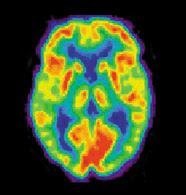Biological Basis for Moral Impulses?

The e-mail came from the next room.
"You gotta see this!" Jorge Moll had written. Moll and Jordan Grafman, neuroscientists at the National Institutes of Health, had been scanning the brains of volunteers as they were asked to think about a scenario involving either donating a sum of money to charity or keeping it for themselves.
As Grafman read the e-mail, Moll came bursting in. The scientists stared at each other. Grafman was thinking, "Whoa -- wait a minute!"
The results were showing that when the volunteers placed the interests of others before their own, the generosity activated a primitive part of the brain that usually lights up in response to food or sex. Altruism, the experiment suggested, was not a superior moral faculty that suppresses basic selfish urges but rather was basic to the brain, hard-wired and pleasurable.. . .
Grafman and others are using brain imaging and psychological experiments to study whether the brain has a built-in moral compass. The results -- many of them published just in recent months -- are showing, unexpectedly, that many aspects of morality appear to be hard-wired in the brain, most likely the result of evolutionary processes that began in other species.
. . .
What the new research is showing is that morality has biological roots -- such as the reward center in the brain that lit up in Grafman's experiment -- that have been around for a very long time.
The more researchers learn, the more it appears that the foundation of morality is empathy. Being able to recognize -- even experience vicariously -- what another creature is going through was an important leap in the evolution of social behavior. And it is only a short step from this awareness to many human notions of right and wrong, says Jean Decety, a neuroscientist at the University of Chicago.
The research enterprise has been viewed with interest by philosophers and theologians, but already some worry that it raises troubling questions. Reducing morality and immorality to brain chemistry -- rather than free will -- might diminish the importance of personal responsibility. Even more important, some wonder whether the very idea of morality is somehow degraded if it turns out to be just another evolutionary tool that nature uses to help species survive and propagate.
Moral decisions can often feel like abstract intellectual challenges, but a number of experiments such as the one by Grafman have shown that emotions are central to moral thinking. In another experiment published in March, University of Southern California neuroscientist Antonio R. Damasio and his colleagues showed that patients with damage to an area of the brain known as the ventromedial prefrontal cortex lack the ability to feel their way to moral answers.
Read it all.

Comments